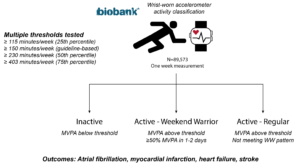Exercise concentrated into longer weekly sessions compared to more regular sessions can provide equivalent cardiovascular benefits.
Khurshid S, Al-Alusi MA, Churchill TW, Guseh JS, Ellinor PT. Accelerometer-Derived “Weekend Warrior” Physical Activity and Incident Cardiovascular Disease. JAMA. 2023 Jul 18;330(3):247-252. PMID: 37462704.
Guidelines and data suggest that 150 minutes or more of moderate to vigorous exercise is beneficial for health benefits, but it is unclear if the benefits of this exercise are different if concentrated over 1 or 2 days (“Weekend Warrior”) or occur on a more regular schedule. A group of nearly 90,000 individuals in the UK Biobank were assessed for their exercise patterns and levels of exercise, and the risk of heart and heart rhythm diseases including heart attacks, heart failure, stroke and atrial fibrillation were analyzed. When participants met a minimum threshold of exercise activity each week of 150 minutes, there were similar benefits for health whether concentrated over 1-2 days or spread out evenly over the course of the week, for atrial fibrillation, heart failure, heart attacks, and stroke.
The study utilized accelerometer data to assess moderate to vigorous exercise load based on a validated machine learning algorithm, as well as to determine the regularity and scheduling of exercise in a large, well-phenotyped clinical cohort to assess the impact of exercise on several cardiovascular endpoints. After accounting for known co-variates of risk, the reduction in cardiovascular endpoints obtained with either Weekend Warrior patterns of exercise, or more regular exercise were both substantial and highly significant, consistent with previous studies. The concept that exercises activity in weekly bursts versus more regular daily challenges can provide equivalent cardiovascular benefits is an important and novel observation that could not have been deduced from first principles.
Some guidelines (American Heart Association) have not specified the ideal intervals for regular exercise, while other organizations such as the UK National Health Service have recommended that exercise be pursued regularly over 4-5 days each week, or even daily if possible. The implications of this current study are that the daily timing or scheduling of exercise are less critical than achieving a threshold of moderate to vigorous exercise activity for a certain duration each week. This set of findings has important public health implications in our exercise recommendations for many individuals whose access to daily versus weekend exercise or recreational sports activities are limited by geographic, economic, or other factors, and who could expect to achieve similar benefits to those who engage in more regular daily activity when the participate in regular weekly but not daily sessions of activity.
The study compared different exercise patterns and covariates of risk.


